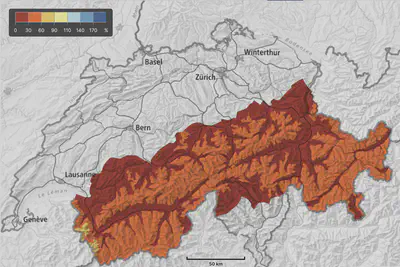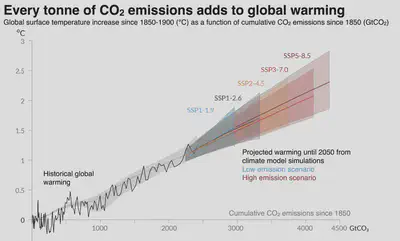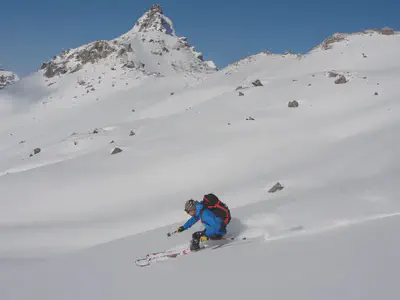Every ton of CO2 counts
 An artificial snow slope created for skiers in Wildhaus, Switzerland, Wednesday, Jan. 4, 2023. The Swiss Alps are confronted with a severe lack of snow and warm temperatures. (Photo by Gian Ehrenzeller/Keystone via AP)
An artificial snow slope created for skiers in Wildhaus, Switzerland, Wednesday, Jan. 4, 2023. The Swiss Alps are confronted with a severe lack of snow and warm temperatures. (Photo by Gian Ehrenzeller/Keystone via AP)
We are not the last generation that can make a change but the first of many that must. Here are some thoughts I wanted to share with fellow snow enthusiasts and others about what cumulative emissions and tipping points mean for the framing of the need for climate action.
This blog was originially published in German for Protect Our Winters, Switzerland.
The dramatic images of ski slopes in the Alps, desperately groomed with artificial snow and eerily set against a backdrop of green mountains, offer a glimpse of the future. And the future strikes faster than many of us expected. At stake here is what we hold dear. These images are a wake-up call to keep the world the way we love it as outdoor enthusiasts, skiers, snowboarders, climbers, sledders, skaters, snow hikers, and other snow lovers. We are reminded that the climate is changing, that the snow is receding, and that the world as we know it is melting away and is becoming a memory of our past. It’s also a wake-up call to protect our winters. POW shows that we can. Our enthusiasm for nature drives us to preserve it. Climate protection and winter sports belong together.

It is clear that our enthusiasm for the crude wilderness and the cold winter leaves traces. There is no life without traces. That’s POW’s message: we can and should strive to reduce our impact on the planet and advocate for change, even as we acknowledge that we are not perfect and leave traces. We are imperfect advocates. Yet it is better to be imperfect advocates than to bury our heads in the sand. This message speaks to me as an avid skier, as someone who feels almost patriotic when the alpenglühen of the snow-covered Alps sets in (their fiery appearance of the snow-covered mountains in the setting sun). And it speaks to me as a climate scientist. Because it makes sense - scientifically! Here’s why.
Suppose I were a professional skier (which I dreamed of being at some point in my life, and perhaps even today). I decide to avoid two of my several planned flights this year. This benefits the climate just as much as if you decide not to book your only two planned flights for your next vacation and celebrate an absolutely flight-free year. Although the latter seems purer, more determined, feels more rewarding, and definitely makes for a better-sounding Instagram post, the climate doesn’t care. A ton of CO2 avoided is a ton avoided - no matter by whom, when, or where on Earth.

Climate research shows that each ton of CO2 we emit causes a certain amount of global warming (see graph above). The warming per ton of CO2 emitted is roughly constant. Observations and projections from climate models show that the average global temperature is increasing with the sum of all CO2 emissions since 1850.
This means that every ton, every gram of CO2 counts. Every ton contributes equally to climate heating. The climate doesn’t care when, where, and anyway by whom the CO2 is emitted. A ton avoided is a ton avoided. This fact contains an important message: it is never too late to avoid a ton of CO2 emissions. Every generation must work to leave the carbon in the ground and save the remaining forests and other carbon-rich ecosystems from their destruction. It is never too late. However, we must continue climate action efforts - starting now and for all generations to come.
We are not the last generation to save the planet. We are the first of many future generations to make a change.
It also means that we are not the last generation to make a difference. On the contrary. We are the first of many generations to make a change. We are the first generation that can seriously turn the wheel in terms of personal life choices and political change that we can set in motion by voting, electing politicians, and by protesting. Here in Switzerland, where I live, we are the first generation to vote on important climate legislation, and we have a second chance this year with the upcoming vote on the counter-proposal to the Glacier Initiative.
It would be fatal to abandon efforts even if the world has warmed by 1.5 degrees Celsius - the number the global community has set as a target. There is no magic threshold at this temperature rise. There are tipping points in the climate system, but we don’t know exactly when they will be reached. That’s a big research question that’s still open. But it doesn’t matter for our decision to protect our winters.
It’s like a white-out - the situation when you completely lose your bearings in the fog and snow. To go further would be to enter unknown and potentially dangerous terrain and to continue to approach a possible precipice. In this situation, we know it is safer to turn around and retrace our steps. By burning fossil fuels and cutting down forests, we have already entered unknown terrain. The climate today is not the same as it was fifty years ago. However, the further we move into this unknown terrain, the more damage we have to expect to our ecosystems, our food production, and our infrastructure. With each additional ton of carbon burned, we march further toward uncertainty. The risk of unexpected climate events and crossing a dangerous climate tipping point increases the further we advance into the unknown terrain. More climate change will make our lives more difficult. For this reason, we must do everything we can to stay in the safe zone. We have already warmed the planet. Some loss of glaciers and snow is already underway. Even with stringent climate action, we will lose more glaciers in the coming decades. This recent study backs up this prediction with disturbing numbers. Glaciers behave like a large cargo ship. Even if the engine stops, the ship will keep going for a while. Even if we drastically reduce CO2 emissions, many glaciers will disappear.
When it comes to warming the planet, it’s a different story. As soon as the emission of greenhouse gases is stopped, we stop heating the Earth (as explained in this blog). It is in our own hands. This is very encouraging. It means we can turn the wheel to avoid even more dangerous levels of climate change and trespassing dangerous tipping points.
We must avoid emissions of CO2 and other greenhouse gases to prevent further warming of the planet. Every ton of CO2 counts, whether it’s today or tomorrow. No matter what you did yesterday, you can start fresh the next day. You don’t have to be perfect to take action on climate change and be part of the change we need to protect our winters!
Protect Our Winters is a non-governmental organization that advocates for climate action and political change. POW speaks to snow enthusiasts and other concerned, but winter fun-loving people through their Alliance Members - professional skiers, snowboarders and others. As a ski touring aficionado and climate scientist, I am proud to be part of the POW Science Alliance. I am convinced that speaking to a wide diversity of voters and fellow Earthlings through shared values and a common understanding of what we want to protect (winters!) is a powerful approach to motivating climate action.
